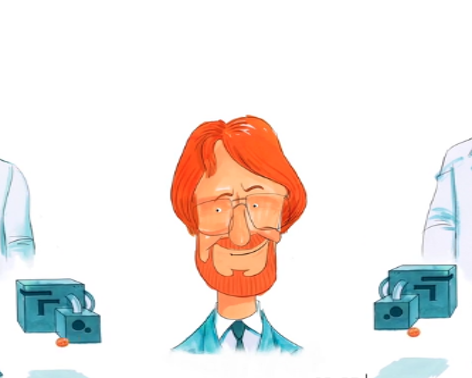decide game:
quantum technologies
Group 1 – Participant 2
Story cards
Read all the cards from this category, choose the one that looks more interesting to you and explain it to the rest of the group.
clara caballero
Story Card 4
I work for a quantum information research group at ICFO, a research centre in Castelldefels, near Barcelona, although we have many colleagues around the world.
In addition to promoting scientific and technological research, I think it is important to tell people about how the latest scientific advances can affect their lives.
In 2016, we coordinated an international project to conduct a quantum physics experiment with the collaboration of the public. More than 100,000 people took part in the Big Bell Test!
francesca falcó
Story Card 5
One of my favourite YouTube channels is one in which a young engineer explains how everyday objects work.
Just yesterday she explained how our cell phones contain lots of transistors and other parts made of semiconductors that are the basic building blocks of digital electronics. All this could not be done without understanding the quantum properties of semiconductor materials that are the basis of these parts.
I did not know I had quantum technology in my pocket! Yeah!
manuel moreno
Story Card 10
I am a pharmacist and in my work it is essential for my scales to be precise to prepare prescription medicines. For this reason, I recalibrate them every year. When I did it in 2019, I was told that the definition of a kilogram in the International System of Units had changed. The definition of the unit of weight used worldwide is now based on a universal constant, the Planck constant, which plays a fundamental role in quantum physics.
info cards
Read all cards from this category, choose the two that look more interesting and explain them to the rest of the group.
correspondence principle
Info Card 6
If everything is made up of quantum particles (atoms, etc.), how can the macroscopic world not have the same “strange” properties as quantum particles?
The correspondence principle states that classic behaviour is the statistical result of the random behaviour of a large number of quantum particles.
We do not yet know where the boundary between quantum and classical theory lies.
second quantum revolution
Info Card 20
Quantum physics has allowed the birth of a first wave of technologies (such as lasers and transistors).
We can now control quantum particles at individual level and are arriving at the point of designing new disruptive technologies (second quantum revolution).
Examples: quantum computing, quantum cryptography, quantum simulators and quantum sensors.
bell test
Info Card 21
Many of the principles of quantum physics defy common sense (e.g. particles must have a well-defined property) or other physical theories (instant action at a distance is not possible). This made physicists wonder if quantum theory was incomplete.
John Bell ended this philosophical debate by designing an experiment that would make it possible to exclude possible alternative explanations to quantum physics that did not defy intuition.
Starting in the 1980s, many Bell tests were conducted that confirmed the validity of quantum physics.
quantum physics and artificial intelligence
Info Card 24
Artificial intelligence has revolutionised technology in recent years. However, in order to be able to apply these techniques to the vast amount of data we have available, we need greater computing power. Quantum computers could be the answer to this problem, allowing us to expand the fields of application of artificial intelligence algorithms.
Moreover, artificial intelligence has contributed to significant advances in the field of quantum physics, helping us solve problems that are almost impossible to solve with traditional computing techniques.
thinking cards
Read all the cards from this category, choose the one that looks more interesting to you and explain it to the rest of the group.
recouping investments
Thinking Card 12
Fundamental research, such as that in certain fields of quantum physics, requires economic resources that do not translate into short-term applications. On the other hand, if we limit research to sectors that can give a rapid economic return, it is difficult to reach the solid general scientific basis that underpins technological progress.
How can we solve this "vicious circle"?
The applications of fundamental science
Thinking Card 14
Many of the technologies that we use nowadays derived from a very different research field. For example, the internet was created at an international particle physics research centre, CERN; satellite positioning systems (GPS, Galileo) owe their precision to the theory of general relativity.
Sometimes, research fields that, in principle, do not have obvious applications, generate useful technologies as side-effects. Should we invest in fundamental research for the potential benefits that would come from possible collateral applications? Or is the advancement of knowledge sufficient reason to put resources into research?
DECISIon
The time and resources available to solve the major problems affecting society are limited. Imagine being part of the committee that has to decide how to invest money to develop quantum technologies at European level over the next few years: since you know that that quantum technologies could benefit society in many different ways, how many resources would you commit to developing them?
This is not an individual decision: each group must reach a unanimous conclusion by arguing properly and rationally based on the facts you have learned so far. There is no right or wrong answer. Like many things in life, it depends on your point of view, your priorities, etc.
quantum technologies are the future
Option 1
Their applications in all fields of human activity will radically change our lives, just as electricity and electronics once did. We must invest as much as we can in their development, to make them commercially viable as soon as possible.
quantum technologies are still too far away
Opció 2
We should not be fooled by illusory promises. We have gone very far with traditional technologies and we still have a long way to go: we should keep the current investment in quantum technologies at the same level. Let scientists do their work and continue to research, focusing on maintaining and improving the technologies that we already have.
we should prioritise
Option 3
Research into quantum physics and its applications is positive, but we currently have other far more important and pressing issues, such as hunger, poverty, wars and terrorism. Let us maintain research, but invest our money to find solutions to the major problems our society has today.
we should boost basic science
Option 4
Quantum technologies are very promising, but if they are to be effective, they require solid knowledge of their foundations. We should invest in fundamental research: a better understanding of the foundations of quantum physics will naturally lead to the development of its applications.









